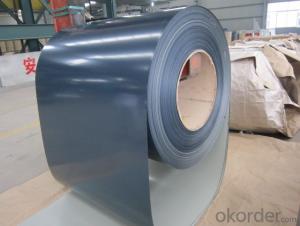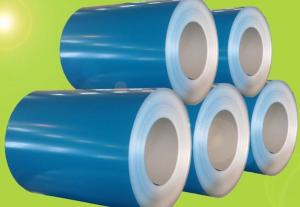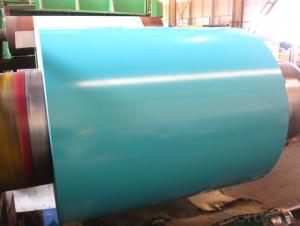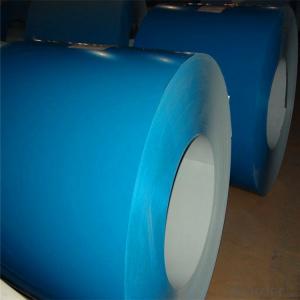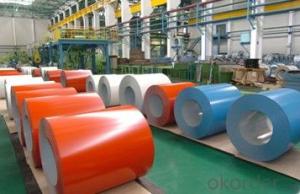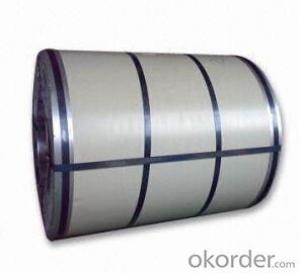PREPAINTED ALUZINC STEELCOIL
- Loading Port:
- China Main Port
- Payment Terms:
- TT OR LC
- Min Order Qty:
- -
- Supply Capability:
- -
OKorder Service Pledge
OKorder Financial Service
You Might Also Like
PRE-PAINTED ALUZINC STEEL COILS
ALUZINC COATING:80 g/m2 (+/-10g/m2)
TOP COATING:5 MIC EPOXY+15 MIC PE
BACK COATING: 5-7 MIC EPOXY
WEIGHT PER COIL:3-5 TONS COLOR:RAL9002
STANDARD:JIS G 3322 CGLCC
1. Resistance to Corrosion Has better performance in corrosion resistance than hot dip galvanized coil/sheet of the same thickness and its service life is 1-5 times longer than general hot dip galvanized coil/sheet.
2. Machinability Can satisfy the processing requirements of rolling, coiling and others processes alike.
3. Thermal Resistance Can sustain the environment at 315°C for long time.
4. High Reflectivity Reflection ability of heat and light is twice as much as those of hot dip galvanized steel coil/sheet, and its reflectivity is more than 0.75, exceeding 0.65 (required by the EPA Energy Star Standard), which is an ideal construction material of saving energy.
- Q: I'm trying to bend stainless steel spoons, forks knives etc. for an art project. Will heating them help bend them into certain shapes or will heat only strengthen it? What is the best way to bend stainless steel?
- Hope this helps!
- Q: How are steel coils inspected for dimensional accuracy after processing?
- Steel coils are inspected for dimensional accuracy after processing using various methods, such as manual measurement with precision tools, laser scanning technology, or automated vision systems. These inspection methods ensure that the dimensions of the steel coils meet the required specifications and tolerances, ensuring their quality and suitability for the intended applications.
- Q: How do steel coils contribute to the HVAC ductwork industry?
- The HVAC ductwork industry relies heavily on steel coils as they are essential for creating ducts. These coils, typically made from galvanized steel, offer numerous advantages in this industry. First and foremost, steel coils are known for their durability and longevity, making them perfect for constructing HVAC ductwork. They can withstand high temperatures, pressure, and exposure to various environmental elements. This durability ensures that the ducts made from steel coils can effectively transport air for long periods without deteriorating or compromising their structural integrity. Moreover, steel coils are highly flexible and can be easily manipulated during the fabrication process. HVAC ductwork often requires customization to fit specific building layouts and designs. Steel coils can be effortlessly cut, bent, and shaped without sacrificing their strength. This flexibility allows for the production of ducts in different sizes, shapes, and configurations to meet the unique requirements of various HVAC systems. Additionally, steel coils provide excellent resistance to corrosion and fire. The galvanized coating on the steel surface acts as a protective layer, preventing rust and corrosion caused by moisture or chemical reactions. This corrosion resistance ensures that the ductwork remains functional and safe for an extended period. Furthermore, steel coils contribute to energy efficiency in the HVAC ductwork industry. The smooth surface of steel coils reduces air friction and turbulence within the ducts, resulting in smoother airflow and reduced energy loss. This improved energy efficiency leads to cost savings for building owners and occupants, as it reduces the amount of energy required to maintain a comfortable indoor environment. Finally, steel coils are readily available and cost-effective, making them a popular choice for HVAC ductwork fabrication. The market offers a wide supply of steel coils, ensuring efficient production and installation of ductwork systems. Additionally, their cost-effectiveness makes them an economical option for both small and large-scale HVAC projects. In conclusion, steel coils play a crucial role in the HVAC ductwork industry by providing a durable, flexible, corrosion-resistant, energy-efficient, and cost-effective material for duct fabrication. These unique properties ensure the construction of high-quality ductwork systems that effectively distribute air in buildings, promoting optimal comfort and functionality.
- Q: What are the dimensions of steel coils used in the furniture industry?
- The furniture industry utilizes steel coils of varying dimensions, which are determined by the specific application and requirements of the furniture manufacturer. Generally, these steel coils possess a thickness ranging from 0.20mm to 3.00mm and a width spanning from 600mm to 2000mm. The length of the coils may fluctuate, but it is typically within the range of 1000mm to 3000mm. These dimensions offer the necessary flexibility to shape and mold the steel coils into diverse furniture components like frames, springs, and structural supports.
- Q: What are the different types of steel coil leveling methods?
- There are three main types of steel coil leveling methods: roller leveling, stretcher leveling, and temper leveling. Roller leveling involves passing the coil through a series of rollers to reduce its curvature and improve flatness. Stretcher leveling uses hydraulic or mechanical stretching to remove the coil's internal stresses and straighten it. Temper leveling, on the other hand, subjects the coil to a controlled heating and cooling process to achieve the desired flatness. Each method has its own advantages and is chosen based on the specific requirements of the steel coil.
- Q: Can steel coils be perforated?
- Yes, steel coils can be perforated. Perforation is the process of creating small holes or punctures in a material, and steel coils can undergo this process to achieve specific purposes such as enhancing ventilation, improving drainage, or creating decorative patterns.
- Q: What are the standard dimensions and weights of steel coils?
- The standard dimensions and weights of steel coils can vary depending on the specific type of steel and its intended use. However, some common dimensions include coil widths ranging from 600mm to 2000mm, coil outer diameters ranging from 800mm to 2100mm, and coil weights ranging from 3 to 25 metric tons. It is important to note that these dimensions and weights can be customized to meet the requirements of different industries and applications.
- Q: What are the different methods of coil slitting for steel coils?
- There are several different methods of coil slitting for steel coils, each of which serves a specific purpose and is used in different industries. Here are some of the common methods: 1. Rotary shear slitting: This is the most widely used method for coil slitting. It involves using a set of rotating knives to cut the steel coil into smaller strips. The rotary shear slitting method is known for its high speed and accuracy, making it ideal for large-scale production. 2. Loop slitting: In this method, the steel coil is fed through a loop control system that maintains a constant tension. The coil is then cut into strips using a rotating knife. Loop slitting is commonly used for thinner gauge materials and is known for its ability to produce clean, burr-free edges. 3. Oscillating shear slitting: This method involves using a set of oscillating knives to cut the steel coil. The knives move back and forth in a rapid motion, creating a shearing effect that cuts through the coil. Oscillating shear slitting is often used for thicker gauge materials and can handle higher tensile strengths. 4. Crush cut slitting: Crush cut slitting is a method where the steel coil is cut by pressing a circular blade against the coil. The blade crushes the material, creating a cut. This method is commonly used for softer materials or when edge quality is not critical. 5. Slit edge rolling: Slit edge rolling is a method that involves rolling the edges of the steel coil after it has been slit. This process smooths out the edges and improves the overall appearance of the strips. Slit edge rolling is often used for applications that require a high-quality finish. 6. Laser slitting: Laser slitting is a newer method that uses a laser beam to cut through the steel coil. This method is precise and can handle a wide range of thicknesses. Laser slitting is commonly used for high-precision applications where edge quality is critical. These are just a few of the different methods of coil slitting for steel coils. The choice of method depends on factors such as the thickness and tensile strength of the material, the required edge quality, and the intended application of the slitted strips.
- Q: I am trying to clean up a stainless steel back splash and some kitchen appliances that have brown spots that look like rust spots. I was able to remove most of them with stainless steel cleaner but does anyone know any tricks?
- if okorder /
- Q: Can steel coils be used in the production of furniture?
- Yes, steel coils can be used in the production of furniture. Steel coils are often used as a raw material in the manufacturing of various types of furniture, such as chairs, tables, and bed frames. Steel coils provide strength, durability, and stability to the furniture, making it suitable for heavy-duty use. Additionally, steel coils can be shaped into different designs and sizes, allowing for versatility in furniture production. The coils can be transformed into various components, such as the frame or support structure of the furniture, providing a solid foundation. Moreover, the use of steel coils in furniture production can enhance the overall aesthetics of the furniture, as they can be finished in different colors and coatings to match the desired style. Overall, steel coils are a common and practical choice for furniture manufacturers due to their strength, durability, and design possibilities.
Send your message to us
PREPAINTED ALUZINC STEELCOIL
- Loading Port:
- China Main Port
- Payment Terms:
- TT OR LC
- Min Order Qty:
- -
- Supply Capability:
- -
OKorder Service Pledge
OKorder Financial Service
Similar products
Hot products
Hot Searches
Related keywords















